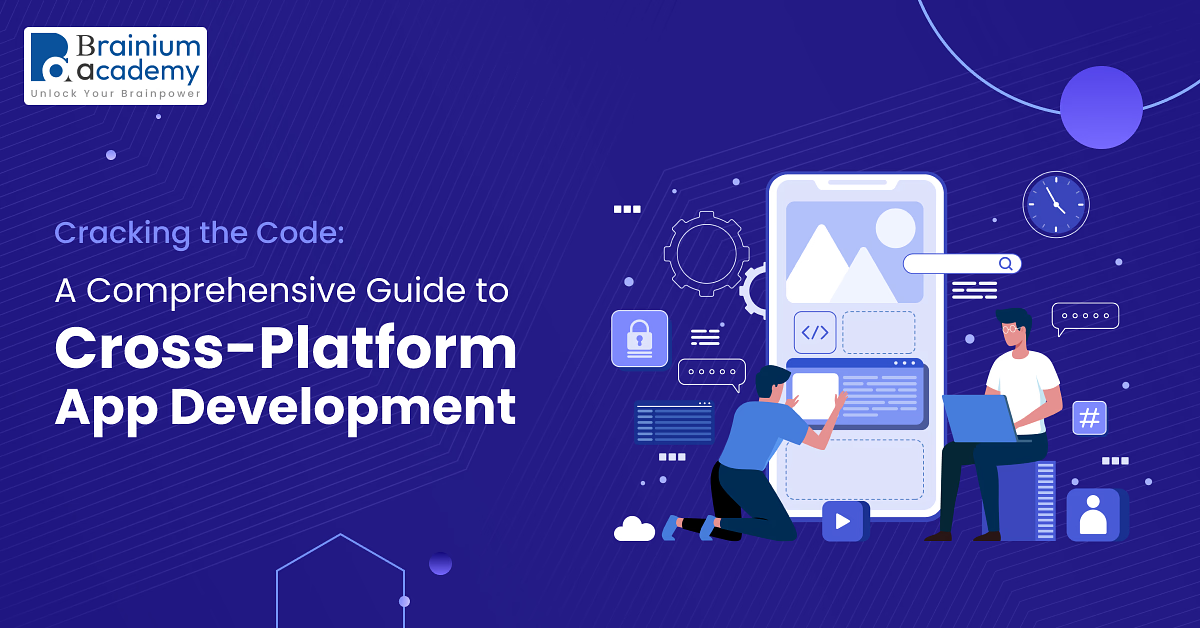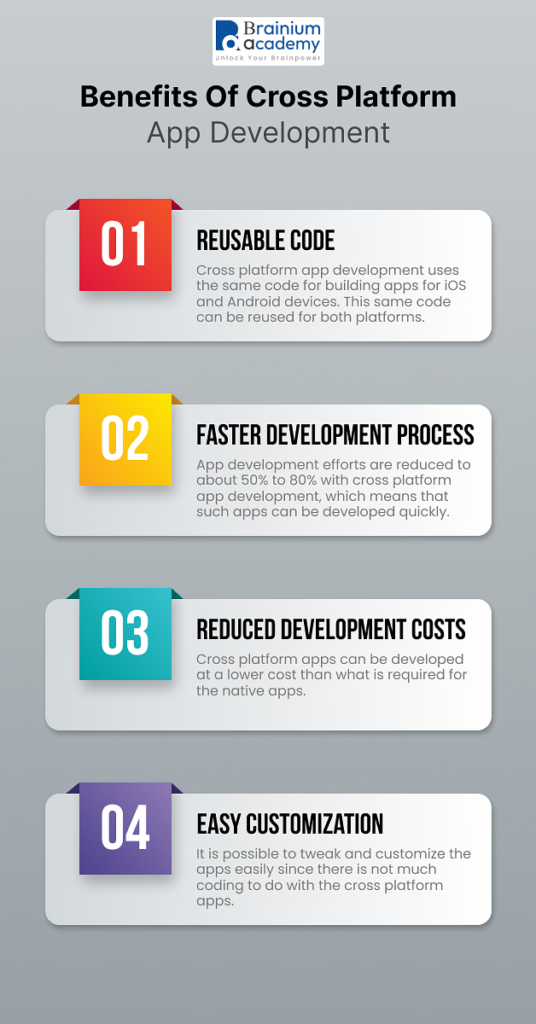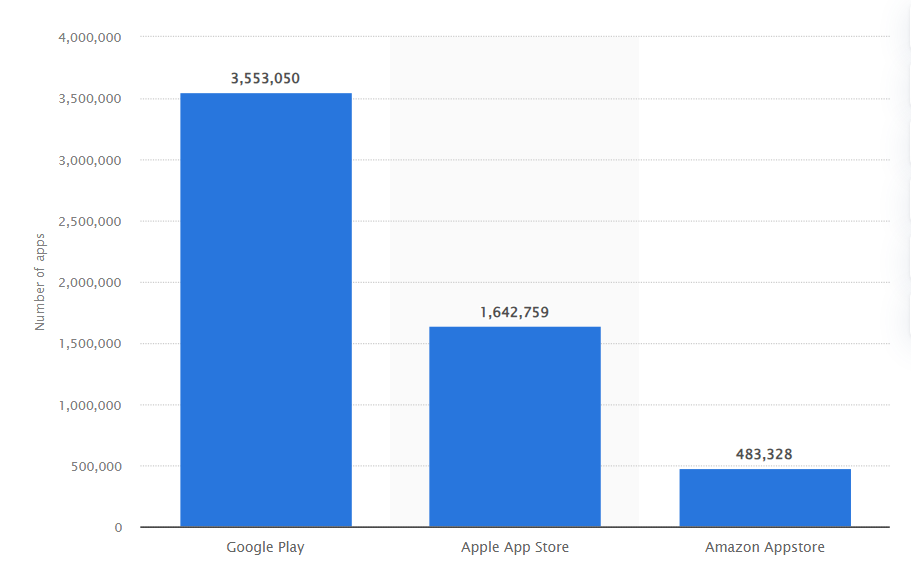
Cracking the Code: A Comprehensive Guide to Cross-Platform App Development
Are you a tech-savvy graduate, an ambitious engineering newcomer, or a student drawn to the exciting field of App development? Suppose, you have a game-changing app concept that has the potential to change the way people live, work, and play. The only snag? You’re not sure how to make that wonderful idea a reality, especially because it needs to work on multiple devices and operating systems.
Don’t worry, you’re about to go on an exciting voyage through the convoluted maze of cross-platform app development. Imagine having the ability to create apps that run seamlessly on iPhones, Androids, and desktops with a single codebase. That is the enchantment of cross-platform development!
Here is a guide that will set you on the path to App development mastery.
What is cross platform app development?
Cross platform app development is a process of developing mobile applications that are compatible with several operating systems at the same time. By using this method, developers can come up with applications that can run on a single codebase. This helps to reduce app development costs. Traditionally, most app developers used to create native apps that could only operate in the mobile OS for which it was made. However, these apps were more expensive and took more time to create. Cross platform apps do not have these problems as they are made from the same basic code which saves a lot of time and effort.
Why opt for cross platform development solutions?
Developing mobile apps has always been a complex process. In native app development, developers working on back-end development have the added pressure of staying consistent and functional across multiple platforms. On the other hand, building native applications was easier even though it was expensive and time-consuming. With native app development, developers could not use the same code for a particular operating system.
The good thing about cross platform development is that it offers some effective solutions to these common challenges. Through cross platform app development, it is possible to share a part of or the whole source code across multiple platforms. This means that developers only need to code the mobile assets once.
Moreover, cross platform apps ensure greater adaptability and more stability for the developers and the end users. They also provide improved functionality and optimum user experience. The process followed in cross platform app development is very different from native development.
What does cross platform App do?
These applications have gained immense popularity in recent years due to the ever-expanding landscape of devices and operating systems, including smartphones, tablets, desktop computers, and web browsers. Here’s a closer look at what cross-platform apps do:
- Universal Accessibility: Cross-platform programs are designed to run fluidly across several platforms such as iOS, Android, Windows, and others. This universal accessibility ensures that users may access the app regardless of the device they are using, hence increasing the app’s user base.
- Faster Development and Updates: Cross-platform development frequently leads to speedier app development and upgrades. Developers may make changes to the codebase and apply updates across all platforms at the same time, ensuring that users receive the most recent features and bug fixes as soon as possible.
- Cost Efficiency: Creating apps for each platform separately can be costly and time-consuming. Cross-platform development frameworks, such as React Native and Flutter, allow developers to create code once and deliver it across several platforms, lowering development costs dramatically.
- Consistent User Experience: Cross-platform apps strive to provide a consistent user experience across all platforms. Users can anticipate comparable functionality, features, and design aspects, making it easy to adapt to the app across platforms.
- Wider Reach: Cross-platform apps can reach a bigger audience by targeting various platforms, which can be very beneficial for organizations trying to grow their customer base or improve brand visibility.
Where cross platform Apps are used?
Cross-platform apps have found utility across various industries and domains due to their versatility, cost-effectiveness, and ability to reach a broad audience.
Here are some key areas where cross-platform apps are commonly used:
- Business and Enterprise Applications: In enterprises, cross-platform apps are widely used for internal purposes such as project management, collaboration, and communication tools. They improve operations by ensuring that employees can use these apps on their preferred devices, such as smartphones, tablets, and desktop computers.
- Gaming: Cross-platform gaming apps have gained popularity, allowing players on different devices to interact and compete in real-time. Popular games have successfully implemented cross-platform compatibility.
- E-commerce: Many e-commerce sites use cross-platform apps to give users a consistent purchasing experience across multiple devices. These apps provide features such as online shopping, product catalog browsing, and secure payment choices, allowing clients to shop effortlessly from any location.
- Social Media: Social media platforms often develop cross-platform apps to ensure that users can access their networks seamlessly on smartphones, tablets, and desktops. This approach maximizes user engagement and extends their reach.
- Education: Cross-platform apps play a pivotal role in the education sector. They offer online learning platforms, interactive educational content, and communication tools for students and educators. These apps enable remote learning and enhance the accessibility of educational resources.
- Healthcare: In the healthcare sector, cross-platform apps are used for electronic health records (EHR) systems, telemedicine applications, and health monitoring. These apps facilitate remote patient consultations, health data tracking, and efficient healthcare management.
- Travel and Hospitality: Travel booking, hotel reservation, and navigation apps are frequently built as cross-platform applications. They provide travelers with consistent access to travel information, booking services, and location-based recommendations.
- Financial Services: Banking and financial institutions use cross-platform apps to offer customers access to their accounts, transaction history, and financial management tools across various devices. These apps prioritize security and ease of use.
Entertainment and Media: Streaming services, news apps, and entertainment platforms rely on cross-platform development to cater to a diverse audience. Users can enjoy their favorite content on smartphones, smart TVs, and desktops.
Benefits of cross platform app development
Let’s have a look at the distinct advantages of investing in cross platform app development solutions.
- Reusable code
One of the best reasons for choosing cross platform app development is that the same code can be repeatedly used for multiple OS versions of the same app. Unlike native app development, cross platform development does not require developers to write fresh codes for every OS. This can help to save time and resources as developers do not need to repeat the tasks associated with creating new codes.
- Better exposure to the target audience
When you have a business app that has been developed with the cross platform approach, it can make it easier for you to target both iOS and Android users. Your app can also be accessed through the web. This means that you can readily reach out to the maximum number of potential customers through your app.
- Easier deployment and maintenance
When you use a cross-platform app, you get to have a single app that is universally compatible with all the platforms. Therefore, maintaining the functionality of the app becomes a lot easier in such cases. You can also deploy code changes as and when you prefer. You can also sync any new updates that you launch on the app over multiple devices and platforms.

- Faster development process
Compared to native apps, cross-platform apps can be developed much more quickly. Since such apps only require a single source code, it can reduce overall developmental efforts by about 50% to 80%. Therefore, investing in a cross-platform app development project is a good idea as it can help to come up with a business app loaded with great features in less time.
- Reduced development costs
The developmental costs for the cross platform apps are lower than that of the native apps. The reason for this is that they are written by a single code, which means that less time and resources are used for developing these apps. The reusable codes can simplify the development process and this can bring down the costs required for developing these apps.
- Easier customization and faster time-to-market
The cross-platform apps come with the added advantage of faster time-to-market (TTM) along with quicker deployment. This is because less time is devoted to writing the code for the app. Developers can also customize the app or tweak it easily to cater to the needs of their clients.
- Quicker integration with cloud settings
The cross-platform mobile applications are readily compatible with the cloud settings and they can be integrated with different types of plug-ins. Developers can coordinate a single source code with different types of extensions and plug-ins so that the app becomes functional and flexible.
- Uniform design
With the cross-platform mobile apps, the users can have the same user interface elements over multiple platforms. This helps the developers to create a seamless and hassle-free experience for their users.
While working on different app development projects, developers find it challenging to sync them all. However, using cross platform mobile app development tools makes it possible for the developers to come up with a simple and uniform user experience for all the app users.
Popular cross platform app development frameworks
Working with specific frameworks makes it a lot easier to develop high-performance cross-platform apps. Here are some frameworks that can be used for developing cross platform apps.
- Flutter
Flutter is an open-source cross platform app development framework for building apps with native interfaces for iOS and Android apps. With this free UI toolkit, developers can work with a single codebase for creating mobile, desktop, and web apps. Flutter was created by Google and ever since it was launched, it gained immense popularity due to its performance, intuitive design, ease of use, and high-speed app development features. The Flutter platform is not only ideal for the development of iOS and Android mobile apps but it can also be used for making desktop and web applications.
Another benefit of using Flutter for making cross-platform mobile apps is that it comes with a hot reload feature that allows the developers to change the code and view the results instantly. This enhances the speed and efficiency of the app development process. Flutter also has a widget-based architecture which makes it easier for the developers to come up with custom UI components that can be further reused across multiple sections of the app. This in turn improves the speed, efficiency, and productivity of a mobile app development process.
- React Native
React Native is an open-source and free framework that can be used for creating native applications for Android and iOS platforms with JavaScript and React, an extensively used web development library. It is one of the major frameworks used for cross platform mobile app development projects. The main advantage of using the React Native platform for developing cross platform mobile apps is that developers do not need to acquire new programming skills for making the apps.
React Native is similar to Flutter in that it comes with a hot reload feature that enables developers to implement changes in the coding and view the results immediately. With React Native, you also get to have support for numerous third-party plugins and libraries, therefore simplifying the whole process of adding new functionalities and features to mobile applications.
- .NET MAUI
.NET MAUI or the .NET Multi-platform App UI evolved from the original Xamarin framework and functions as an open-source platform that can be used for building different types of cross-platform mobile apps. The mobile app development framework has been developed by Microsoft and it is based on the C# programming language and .NET framework.
The .NET MAUI framework is equipped with Hot Reload, just like React Native and Flutter. It uses XAML for creating the UI and the layouts. The tool is equipped with numerous themes and styles that can be used for UX/UI customization. The app code can be uniformly maintained with .NET MAUI and it allows users to work with different types of app architectures like Model-View-View-Model (MVVM), Model-View-Presenter (MVP), and Model-View-Controller (MVC).
- Ionic
Ionic offers a simple syntax along with a library of CSS, JavaScript, and HTML components that can be used for developing interactive and user-friendly cross-platform apps. This cross platform framework presents hardware-accelerated transitions along with touch-optimized gestures which can help in improving the performance and speed of the apps. Considered to be one of the finest hybrid app development frameworks, Ionic can be used for making visually arresting and dynamic apps.
Ionic presents an extensive set of tools and features, and developers can benefit from out-of-the-box support for their material design goals. With Ionic, developers also get access to native-style user interface (UI) layouts and elements for making mobile apps. Ionic allows developers to create apps that are user-friendly and come with excellent customization features.
Future trends for cross platform app development
As of the 3rd quarter of 2022, there were around 3.55 million apps in the Google Play Store and 1.6 million apps in the Apple App Store. Together, iOS and Android devices make up 99% of the mobile app market across the world. This makes app development one of the most lucrative career options these days. For instance, students opt for cross platform app development courses as a rewarding career rather than being a native app developer.
While looking to get an app that seamlessly works on both Android and iOS devices, there are several possible app development options that you can consider. For instance, you can get separate native applications for both operating systems and use progressive web apps, hybrid apps, or cross-platform apps. Among these, cross-platform apps are the most popular option that you can consider for your business. Read on to learn more about cross platform app development and its growing prospects.

As technology is changing rapidly, the prospects of cross platform app development are likely to improve greatly in the coming years. Here are some of the innovations that are going to radically alter the way cross-platform apps for iOS and Android are developed.
- AI or Artificial Intelligence is fast changing the way humans interact with the world around them. It can be a powerful tool for creating cross-platform apps and helping with customization and app testing.
- Cloud technologies offer security, scalability and flexibility for developers when they are developing apps. A cloud environment can also help in maintaining and upgrading the apps.
- The Internet of Things (IoT) can be seamlessly integrated with cross-platform apps to provide the end users with a smooth user experience. IoT can also help in the development of apps and also ensure a seamless connection with numerous types of devices.
Wrapping up
Most app development companies these days look for cross platform development professionals since they can help in creating iOS and Android apps without the use of extensive resources. If you are looking to learn about the React Native platform and/or the Flutter platform and how they can be used for making cross platform apps, you should consider signing up for a course in cross platform app development. You can enroll in a basic certification course to learn about the various aspects of cross platform app development. These courses are designed according to the current requirements of the app development industry.



